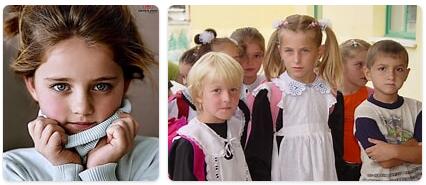Yearbook 2016
Albania. Parliament adopted a series of constitutional amendments in July with the aim of reducing the political influence over the judiciary and combating corruption and organized crime. The reform package was a key condition of the EU for Albania to start membership negotiations. It was adopted unanimously after 18 months of negotiations in which the Democratic Party, which is leading the opposition, has long opposed foreign experts to participate when judges are appointed. After mediation by the US and the EU, and the threat of withdrawing the country’s candidate status in the EU, agreement was reached. Despite this, the opposition subsequently appealed against the legislative changes, but the Constitutional Court finally approved them in December.
The current population of Albania is 2,877,808. The second royal wedding in Albania’s history was held in October, when 34-year-old Crown Prince Leka married actress Elia Zaharia. The semi-official wedding ceremony was conducted by the mayor of Tirana, while representatives of both Muslim and Christian communities gave their blessing. Leka is an adviser to the Foreign Minister. The only royal wedding held in the country was when Leka’s grandfather King Zog married in 1938, a year before he was expelled from power and the monarchy in practice ceased.

Around 20,000 Albanian Catholics participated in the Blessing of 38 Catholics executed or tortured during the Communist era, between 1945 and 1985, in November. Representatives of the Vatican also attended the ceremony, in a cathedral in Shkodër.
The June 2013 parliamentary election was a stinging defeat for Sali Berisha’s Conservative coalition, falling from 46.9% of the vote to 39.4%. The Social Democratic coalition, in turn, went from 45.3% to 57.6% and Socialist Party chairman Edi Rama became new prime minister and inaugurated in September. The Socialist Party itself got 41.4% of the vote.
One month after his deployment, Rama carried out a comprehensive restructuring of the police to cope with the rapidly rising crime. All police chiefs in the country’s 12 administrative regions were replaced.
In October, the European Commission presented its annual report on potential new Member States, highlighting Albania’s successful holding of the June parliamentary elections. The Commission then recommended that the country be granted “candidate status”. However, several states – including Denmark and the Netherlands – were opposed, so the decision was postponed. In June 2014, it was then decided to accept Albania as a candidate member.
During the periodic review of the human rights situation in the country conducted by the United Nations Human Rights Council in September 2014, Albania agreed to enter the International Convention on Disappearances into its legislation and agreed to take measures to reduce discrimination against Roma and the Egyptian minority community in the country. According to thereligionfaqs, Albania had a long tradition of discrimination against the Roma in particular.
Freedom of expression was under intense pressure due to self-censorship in the media and threats by the government towards media and journalists. In June, journalist Aurora Koromani had to have police protection after she wrote about IS ‘s recruitment of volunteers in the country. Several other journalists applied for asylum in the EU and Norway because the authorities were unable to protect them.
Many Roma, Egyptian immigrants and young people were unable to earn an income that gave them access to social housing. At the same time, many Roma were not allowed to legalize their housing on the basis of the new 2014 Housing Act, which allowed the authorities to level “illegal housing” with the land. In July 2015, 70 Roma families confiscated their land and removed their houses prior to new road construction in Tirana.
A parliamentary commission published in June 2015 a report documenting widespread corruption in the police and judiciary. But corruption is also widespread among politicians. Among other things. there were persistent reports that Prime Minister Edi Rama had received DKK 2 million. US $ in bribes. In November, the European Commission demanded that Albania take serious steps to protect human rights, implement judicial reforms and fight corruption and organized crime before opening negotiations. In December, 50,000 in Tirana demonstrated against the corruption in government and rising poverty.
The right wing conducted protests against the government in February-May. It claimed that government members were involved in the ever-expanding production and trade of Canabis, demanded the departure of several government members and the introduction of an electronic electoral system for the June parliamentary elections. In March, Interior Minister Saimir Tahiri and three other ministers resigned because of the growing political tension. The crisis was only resolved in May, after the opposition was given a newly created post as Deputy Prime Minister and 6 ministerial posts in the sitting government, as well as the introduction of an electronic voter registration system.
In April 2017, Parliament elected Ilir Meta as president with 87 out of 140 votes. The opposition boycotted the vote.
The June parliamentary elections were won by the ruling Social Democracy, which went up 9 seats to 74, while the right-wing Democratic Party went back 7 seats to 43. The leader of Social Democracy, Edi Rama, then formed government with himself as prime minister. An important reason for the Social Democratic victory was the government’s economic policy in previous years, which had increased economic growth from 0.5% in 2013 to 3.5% in 2016. The government had also initiated a normalization of relations with Serbia. In 2014, the Prime Minister visited Belgrade, the first Albanian state visit in 70 years.